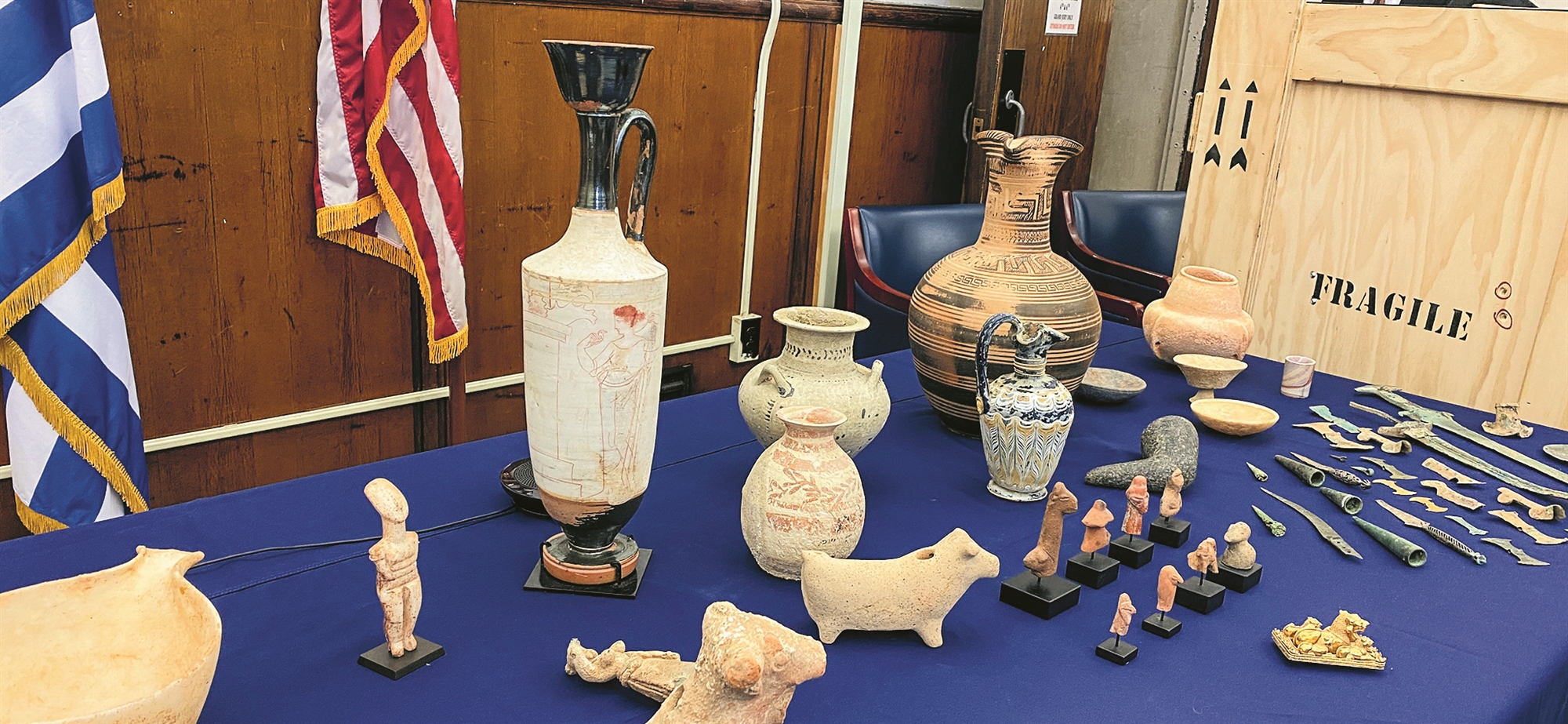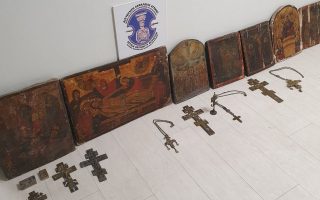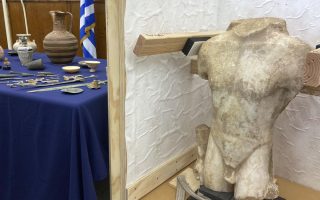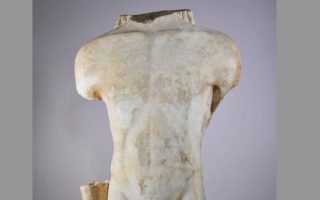Tracking down looted cultural treasures
Manhattan Assistant District Attorney speaks to Kathimerini about investigation into, repatriation of stolen antiquities
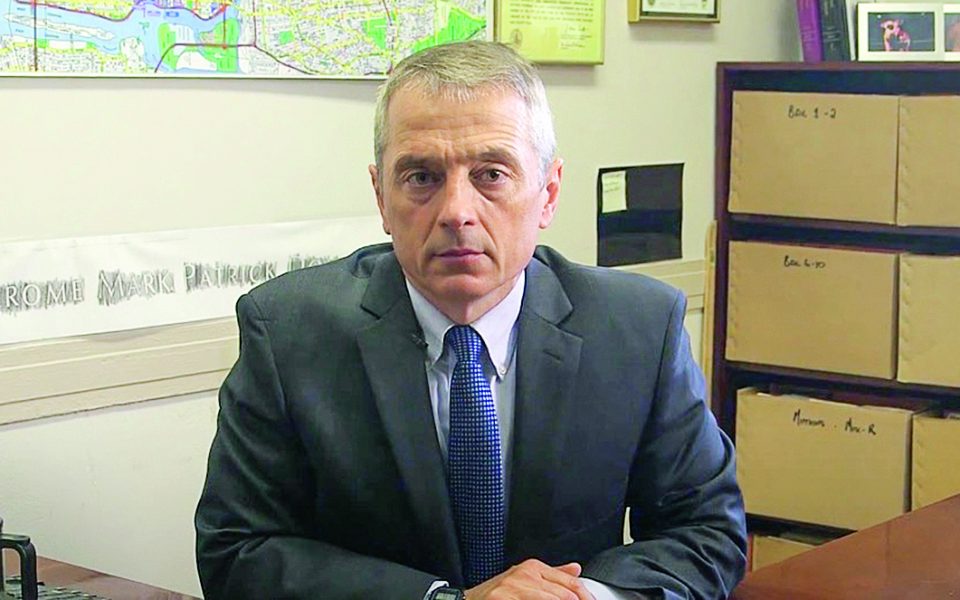
“I do not like Matthew Bogdanos stories, I don’t like talking about myself,” says Manhattan’s Assistant District Attorney Matthew Bogdanos, and he sounds like he really means it. “I want to talk about the work that we do in the Antiquities Trafficking Unit, in the DA’s office,” he insists, referring to the only one of its kind in the world that investigates cases regarding looted artifacts. And of which he is the chief.
“We were able to recover more than 3,600 priceless cultural treasures from two dozen countries, half of them have been already repatriated.” The repatriation of Greek antiquities, which took place on Wednesday in New York in the presence of Greek Culture Minister Lina Mendoni, is the result of Bogdanos’ hard work and dedication. Forty-seven of the treasures come from a multiyear, multinational criminal investigation into the collection of hedge fund pioneer Michael Steinhardt, who among the thousands of masterpieces that he owns also had 180 objects of illegal provenance.
The Steinhardt case was brought to light by Bogdanos in 2018 and is indicative of the complicity that frames the circles of the old aristocracy and so-called new money. Complicity that is outrageous. “We say stop, enough is enough,” he explains, clearly angry, and rightly so. Time-consuming processes, bureaucratic challenges, all kinds of people involved, research that extends to every corner of the globe. From the dusty alleys of the Middle East to the near-inaccessible lounges of Fifth Avenue. His job is neither easy nor ordinary. But it is the one he wanted to do as a youngster when he was working in the family restaurant.
Growing up in New York with the strict principles and rules of a typical immigrant family from Limnos, he managed to study at Columbia, get two master’s degrees and become a colonel in the US Marine Corps. This is how his own story unfolds. A story which I understand out of modesty he chooses to refer to very briefly. And hesitantly.
After 9/11, he went to Afghanistan, where he was tasked with improving security at the Kabul airport. He contributed to the identification of hundreds of senior Taliban and al-Qaeda leaders, including 11 of the 25 most-wanted figures in the War on Terror. Iraq followed.
“I was the head of a counterterrorism task force, on another mission in Basra when the looting of the National Museum took place. As a Greek American, I was raised to really appreciate antiquities, cultural heritage and Classical civilization. I knew that I had to do something, so I volunteered. I spent the better part of five years as head of the investigation,” he recalls.
He found and recovered 10,000 looted antiquities. His book “The Thieves of Baghdad” came shortly after. As well as the recognition of his efforts at the highest level, when the National Humanities Medal was awarded to him by President George W. Bush in 2005.
‘I was the head of a counterterrorism task force, on another mission in Basra when the looting of the National Museum took place’
When he returned to the Manhattan District Attorney’s Office, he became involved in unsolved cases of antiquities looting. “At the beginning, it was just me and a Department of Homeland Security agent, but there was so much work for two individuals that we began expanding. Now we have 15 people assigned to the unit – and this really should be the point of the story.”
He really admires his team: “They are the best of the best, you will not find more remarkable, dedicated and experienced professionals in the world. This is a dream team; they can work wonders.”
I ask him if the formation of the unit has discouraged looters and buyers and generally if it has affected the whole process, from the mere thieves to the usually very, very rich final recipients. “I have good news and bad news,” he says. “Those who voluntarily contact us to reveal that they have an object that they acquired years ago, but do not know if it is legal, have increased a lot.” Museums, institutions, galleries, private collectors.
“Only last week we received phone calls from all over the world – “When I bought it I did not ask for anything other than its price,” they tell us. The question that many prospective buyers are starting to ask is the right one: ‘Where and how was it found?’ Many auction houses and museums have improved their due diligence, they are doing a better job in asking the right questions. They don’t only ask how much, but also where it came from, and if it’s legal.” The second positive is that items without good provenance are decreasing in value.
The bad news, as he explains, is “that some organizations do not operate in New York anymore purely to avoid the Manhattan DA’s office. A disturbing trend we see is that the market has shifted. New York was the number one market; we now see buyers particularly in the Middle East. You can draw your own conclusions,” he tells me.
I ask him if any case stands out. “Ask me which one of my four kids I love the most; I love them all equally. Every case for us is special because we recognize that for someone, somewhere in the world, this object means something. Objects are not numbers, each of them represents a cultural period, a history.”
I feel like he could talk endlessly about each object. He remembers all their details, their texture, their fragility. He sees their beauty even in the cracks, which some of them have, as he remembers. “There are some antiquities which at first sight have nothing special. But when you realize that there are unique in the world, then you stand in awe. You see their greatness, their glory.”
I ask about the other half of the 3,600 items seized and retrieved that weren’t returned to their countries of origin. “Once we complete the investigation, we are ready for the repatriation process. However, the country of destination must also be ready to receive them. Many countries, like Italy, have been in lockdown. Others are not able to accept them due to their situation. We are frequently at the mercy of the country even after we have finished the investigation. Lebanon is a good example: We have several dozen exceptional antiquities from Lebanon but we cannot return them because it is almost a failed state.”
“And what do you do in the meantime?” I ask, and he reveals to me that at Manhattan’s DA Office there is a small museum, inaccessible to almost everyone. “Every journalist’s dream,” he comments when I ask him if I would be allowed to see it. “My answer is always a non-negotiable no. For us, these pieces are extraordinary pieces of our shared cultural heritage but also evidence in criminal cases.”
He speaks to me with true passion about “The Iliad” and “The Odyssey” he read with discipline when he was just 12 years old at the urging of his waitress mother. He tells me that those books shaped him: “They are not just books, they are guides to a life well-lived. There are very few issues, challenges, problems in today’s world that are not addressed in the Classical literature of the Greeks, the Romans and the Persians. ‘The Iliad’ is a roadmap to living your life with honor, integrity, dedication and determination.”
I wonder silently how can I ask him about Kim Kardashian when he talks to me about “The Iliad.” But in the end, I do, very aware of the danger of embarrassment. “Is it true that the investigation into the looting of the gilded ancient coffin from Egypt, which was sold to the Metropolitan Museum of Art in New York for 4 million dollars, began with a photo of Kim Kardashian at the 2018 Met Gala?” “Yes, unfortunately, I have to admit that that story is 100% accurate,” he says, laughing. I sigh with relief.
